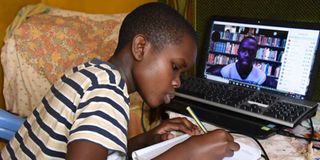Embrace virtual learning in CBC system

On May 13, President Uhuru Kenyatta and British Prime Minister Boris Johnson held a virtual event that brought together learners from Westlands Primary in Nairobi and Cleves Cross Primary in London.
The event brought into focus the importance of virtual exchanges between learners in fostering the achievement of the key competencies enshrined in the Basic Education Framework of the Competency-Based Curriculum. The learners engaged with each other on issues related to education in their two nations.
This demonstrated the numerous benefits of how teachers can integrate virtual meetings in their lessons. The curriculum framework spells out the various skills that learners must develop for the 21st Century workplace. These include digital literacy, creativity, critical thinking, self-efficacy, communication, and collaboration.
Integrate competencies
Virtual exchanges are suitable for developing these skills since learners collaborate in projects using digital tools that integrate various competencies. They learn how to work with others from diverse cultural backgrounds and in the process, acquire intercultural communication skills. Virtual exchanges provide the opportunity for learners to understand the different global contexts and become more aware of themselves and others. This is essential for cultivating empathy, global understanding, and the ability to engage with difference.
Learners who are exposed through virtual exchange can travel to other countries without leaving their classrooms. They experience the benefits of working with different online collaborative tools such as Zoom, Google Meets, docs etc. These digital literacy skills are not directly taught because the students acquire them as part of the program activities.
These help overcome the limited time that teachers have to teach the skills in class.
Kenyan teachers can develop virtual exchange programmes with partners in other countries. The British Council runs a programme called ‘connecting classrooms through global learning’. Schools can choose partners around the world and work on collaborative projects. They get opportunities to explore global issues such Sustainable Development Goals, global warming and climate change. Students develop critical thinking and problem-solving skills as they work together around these issues.
Dr Daniel Otieno, KU
*** *** ***
The Ministry of Education has stopped the ranking of schools because it puts unnecessary pressure on students. Teachers and parents used to make grades the centre of interest in education, leading to cheating.
The competency-based curriculum discourages exams and promotes practicals.
CBC will have a better outcome since it emphasises on application of competencies.
Fred Sagala, Uasin Gishu




